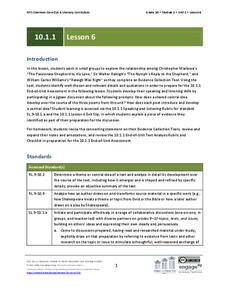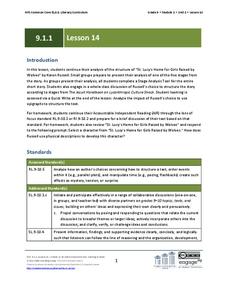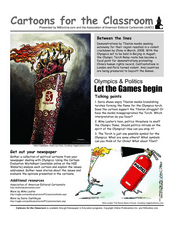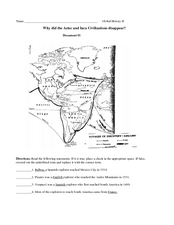Novelinks
Touching Spirit Bear: Directed Reading Thinking Activity
What experiences lead people to change and how do they do it? After reading about Cole's encounter with Touching Spirit Bear, readers complete the second out of a series of five activities to predict future events in the text. The...
Curated OER
Questioning Strategy for Les Miserables
After reading or watching the musical Les Miserables, challenge your high schoolers with these analysis questions. The sheet provided suggests having class members record the answers to these questions, but they would also be good...
Chicago Botanic Garden
GEEBITT (Global Equilibrium Energy Balance Interactive TinkerToy)
Students use the GEEBITT excel model to explore how global average temperatures are affected by changes in our atmosphere in part two of this series of seven lessons. Working in groups, they discuss, analyze graphs, and enter data to...
EngageNY
Grade 9 ELA Module 1, Unit 1, Lesson 10
As you work through a literary analysis unit based on Karen Russell's "St. Lucy's Home for Girls Raised by Wolves," use a writing assessment to measure your class's skills. They choose one epigraph from the story to analyze and track...
EngageNY
Grade 10 ELA Module 1: Unit 1, Lesson 6
Wrap up your literary analysis unit with a discussion activity as tenth graders prepare for an end-of-unit assessment. After they have read and annotated Christopher Marlowe's "The Passionate Shepard to His Love," Sir Walter Raleigh's...
EngageNY
Grade 9 ELA Module 1, Unit 1, Lesson 14
Karen Russell's short story "St. Lucy's Home for Girls Raised by Wolves" has a unique structure that adds value to the story. With the fourteenth activity in a unit about literary analysis and textual support, analyze how Russell has...
US National Archives
WWII: Western Europe 1939-45 – Resistance and SOE
Germany seemed to be unstoppable in the early years of World War II, but the tireless and sacrificial work of the Special Operations Executive (SOE) helped to steer the war in another direction. After exploring primary source documents,...
US National Archives
Eastern Europe 1939-45 — Berlin
The inevitability of World War II has arrived: Berlin has fallen. Young historians watch contemporaneous footage of the event, analyze primary source documents, and write a news report that details the roles of the Soviet, British,...
DocsTeach
Evaluating Perspectives on Westward Expansion
Although popular culture tells the story of the American West simplistically, its reality is far more complex. Native American tribes—while already on the land—didn't have the same interests, and conflicts between white settlers and...
Curated OER
Excerpt from Edward Bain's The History of Cotton Manufacture in Great Britain (1835)
Great Britain was where the industrial revolution began. The class reads an excerpt from a document written in 1835 describing cotton manufacture in Great Britain. They then answer two critical analysis questions.
Curated OER
Center for Northwestern Art: Featured Objects
Each of the slides in this presentation provide learners with an image found at a northwestern art museum and a critical analysis of what can be seen in each piece. Learners can view this prior to a museum trip in order to build...
Curated OER
Olympics and Politics: Let the Games Begin!
Let the games begin! Use political cartoons to analyze current events regarding the Olympic Games. This worksheet includes two cartoons depicting the 2008 Beijing Olympics, background information to help with analysis, and talking points...
Curated OER
The Learning Network: Reactions to Rating Teachers
Meant to be used in connection with the article "In Teacher Ratings, Good Test Scores Are Sometimes Not Good Enough" also available on The New York Times website, this resource provides 12 short-answer writing prompts that ask both basic...
Curated OER
Why did the Aztec and Inca civilizations disappear?
Middle schoolers can analyze primary source documents to answer the question, "Why did the Aztec and Inca civilizations disappear?" They will read the provided excerpts then answer 11 different questions to uncover the ultimate answer.
Curated OER
That Is Not My Opinion!
Being an informed citizen requires distinguishing fact from opinion and understanding persuasion methods. Secondary learners evaluate newspaper editorials. They read opinion pieces, identify the writer's purpose and position on an issue,...
Institute for Teaching through Technology and Innovative Practices
The Right Number of Elephants
How can you tell if a number of items is reasonable? Combine math and language arts with a fun lesson based on Jeff Shepard's The Right Number of Elephants. After reading the book, kids discuss amounts of other items and create minibooks...
University of Richmond
Renewing Inequality: Family Displacements through Urban Renewal 1950-1966
What is progress? Who bears its cost? High schoolers consider the questions as they review data on families displaced by urban renewal projects in the 1950s and 1960s. An interactive, curated data project asks historians to consider the...
Curated OER
Regarding the Fountain: Questioning Strategy—Cubing
Look deeper into the text with a reading strategy based on asking critical thinking questions. While reading Reading the Fountain by Kate Klise, learners think of questions that help them describe, compare, associate, analyze, apply, and...
Centers for Disease Control and Prevention
Major Disparities in Adult Cigarette Smoking Exist Among and Within Racial and Ethnic Groups
Data indicates that some racial groups smoke more than others, and that with that racial group, there are smaller groups whose smoking habits vary as well. Secondary learners read a graph that details the differences between the Asian...
Curated OER
Borrowing from the Greek Debt
Use political cartoons to help your class understand the European Debt Crisis and visual symbolism. This analysis handout includes two cartoons depicting the crisis and prompts learners to consider possible symbols and allusions to best...
Curated OER
Popular Music and Music Videos
This resource is part of a three-activity unit that introduces your class to the concept of popular culture and the role that it plays in their lives. Here, learners examine the importance of the music industry and music videos in pop...
EngageNY
Grade 9 ELA Module 2, Unit 2, Lesson 16
Was Oedipus' destiny determined by fate or by his actions? Using details from the text, ninth graders delve into a critical thinking exercise based on Sophocles' Oedipus the King. Now that Oedipus has learned his true identity, readers...
Cloud Front
Socratic Seminar for: A Christmas Carol
Socratic seminars are a great way to encourage the development of critical thinking, speaking, and listening skills. And Charles Dickens' A Christmas Carol is a perfect text for such a seminar. Use the questions in the packet to...
Prestwick House
"Because I could not stop for Death" -- Visualizing Meaning and Tone
Emily Dickinson's "Because I could not stop for Death" provides high schoolers with an opportunity to practice their critical thinking skills. They examine the images, diction, rhythm, and rhyme scheme the poet uses and consider how...

























